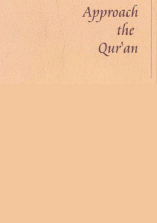Approach the Quran

Pondering over the Meaning of the Qur' an
One of the inward manners that one should abide by when reading the Glorious Qur'an is pondering over the meaning of the Qur'anic words and verses. When reading the Glorious Qur'an, one is recommended to think of the meaning and significance of what he reads. Allah, Most High, has revealed the Glorious Qur'an in order to be reflected upon and understood. In this connection, the Glorious Qur'an says,
(Here is) a Book which We have sent down unto thee, full of blessings, that they may meditate on its Signs, and that men of understanding may receive admonition.
(Sad:29)
Furthermore, Allah, Most High, urges people to reflect on the Glorious Qur'an saying,
(Do they not consider the Qur'an (with care)? Had it been from other than Allah, they would surely have found therein much discrepancy.
(An-Nisa': 82)
(Do they not then earnestly seek to understand the Qur'an, or are their hearts locked up by them.
(Muhammad: 24)
In his Jami' Al-ilm, Ibn `Abd Al-Barr reported on the authority of `Ali (may Allah be pleased with him) who said, "There is no good in worship without consciousness, in knowledge without understanding, nor in reading without contemplation."
Ibn `Ahbas (may Allah be pleased with them both) said, "It is better to read snrat Az-Zalzalah and Al-Qari`ah with contemplation than to heedlessly read surat Al-Baqarah and Al Imran."[1]
Zayd ibn Thabit (may Allah be pleased with him) said, "In my opinion, it is better to read the Glorious Qur'an in a month than to read it in fifteen days, to read it in fifteen days is better than to read it in ten days, and to read it in ten days is better than to read it in seven days, as long as I ponder (over the meanings of the verses) and invoke (Allah)."[2]
Apparently, reading the Glorious Qur'an slowly paves the way for contemplation, which is the avowed objective of reading the Glorious Qur'an. The Glorious Qur'an, according to M. S. Ar-Rafi`i, consists of words of light.
Allah, Most High, says,
(This is) a bank, with verses basic ar fundamental (0f established meaning). further explained in detail, from One who is Wise and Well-acquainted (with all things).
(Hud: l)
The Glorious Qur'an is further described in a Prophetic hadith as follows,
"(The Qur'an) comprises endless marvels…. Whoever tells depending on it, will be truthful; whoever passes judgment on basis of it, will be just; whoever acts according to it, will Be rewarded (by Allah); and whoever calls to it, will be guided to the straight path. "[3]
The Glorious Qur'an is full of signs, wisdom, rules, proofs, instructions, and miracles. Therefore, deep thinking and contemplation in reading the Qur'an is the only way to realize these contents.
If a reciter of the Glorious Qur'an needs to repeat the Qur'anic verses to understand and reflect on them, he is recommended to do so. This was the custom of the Prophet (peace be upon him), the Companions (may Allah be pleased with them all), and the early Muslims. In this context, Abu Dharr (may Allah be pleased with him) reported, "One night, the Messenger of Allah (peace be upon him) led us in the Vigil Prayer, in which he repeated the following Qur'anic verse during the whole Prayer: (QU Thou dost punish them, they are Thy servants: if Thou dost forgive them, Thou are the Exalted in power, the Wise. (Al-Ma'idah: l l8)."[4]
Likewise, Tarnim Ad-Dari prayed the whole night repeating the following verse: (What! Do those who seek after evil ways think that we shall hold them equal with those who believe and do righteous deeds, that equal will be their life and their death? III is the judgment that they make. (Al-Jathiyah: 21) [5]
Ibrahim ibn `Alqamah said that, "I prayed beside `Abdullah (ibn mas`ud) when he recited from the beginning of sara! Taha until he repeated the following verse thrice: (Say, 'O my Lord!
Advance me in knowledge. (Taha: ll4).[6]
Speaking about his mother, `Urwah ibn Az-Zubayr said, "Once, I entered upon Asma' bint Abi Bakr when she was performing Prayer reciting the Qur'anic verse that reads, (But Allah has been good to us, and has delivered as from the Penalty of the Scorching Wind. (At-Tur: 27), then I stayed for a long time, then I went to the market and then returned home while she was still repeating the same verse."[7]
`Amir ibn says, similarly, once commenced the Night Prayer with sarat Ghafir until he reached the verse that reads, Warn them of the Day that is ( ever) drawing near, when the hearts will (come) right up to the throats to choke (them) (Ghafir:18), and repeated it until dawn."[8]
The righteous successors like Sa`id ibn Jubayr and Ar-Rabi` ibn Khaytham were accustomed to do the same practice. Abu Sulayman Ad-Darani said, "I used to recite and ponder on a single Qur'anic verse in the Night Prayer for four or five days. Yet, if I did not stop reflecting upon that verse, I would not pass on to another verse."[9]
[1] What is meant by lbn `Abbas is that he preferred attentively reading small snrahs such as Az-Zalzalah and Al-Qari`ah over heedlessly reading long siirahs such as Al-Baqarah and Al ` Imran. (Trans.)
[2] Ibn Abi Shayhah, Al-Musannaf
[3] Reported by At-Tirmidhi.
[4] Reported by An-Nsa'i.
[5] Reported by Abu Dawud.
[6] Reported by Ibn Abi Dawud.
[7] Reported by Ahmad.
[8] Fada'il Al-Qu'an, Reported by Abu `Ubayd.
[9] Fada'il Al-Quran, Reported by Abu `Ubayd.
